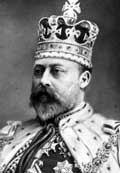 |
Edward VII
b. 9 Nov 1841, London
d. 6 May 1910, London |
| Title: |
By the Grace of God, of the United Kingdom of Great Britain and Ireland King, Defender of the Faith, Emperor of India (Dei Gratia Britanniarum Rex, Fidei Defensor, Indiae Imperator) [22 Jan 1901 - 4 Nov 1901] |
|
By the Grace of God of the United Kingdom of Great Britain and Ireland and of the British Dominions beyond the Seas King, Defender of the Faith, Emperor of India (Dei Gratia Britanniarum et terrarum transmarinarum quae in ditione sunt Britannica Rex, Fidei Defensor, Indiae Imperator) [4 Nov 1901 - 6 May 1910] |
| Term: |
22 Jan 1901 - 6 May 1910 |
| Chronology: |
22 Jan 1901, succeeded his mother, Victoria |
|
4 Nov 1901, royal style changed by Order in Council approving Proclamation making an Addition to the Style and Titles Appertaining to the Imperial Crown of the United Kingdom and its Dependencies (Statutory Instruments, 1901, pp. 53-54) |
|
9 Aug 1902, crowned, Westminster Abbey |
|
6 May 1910, died |
| Names/titles: |
Private name: Albert Edward; Duke of Cornwall, Duke of Rothesay, Earl of Carrick, Baron Renfrew, Lord of the Isles, Great Steward of Scotland [from 9 Nov 1841]; Prince of Wales, Earl of Chester [from 8 Dec 1841]; Earl of Dublin [from 17 Jan 1850] |
| Biography: |
The eldest son of the Prince Consort Albert and Queen Victoria, Albert Edward studied at the universities of Edinburgh, Oxford, and Cambridge. He succeeded to the throne as Edward VII in 1901 after holding the title of Prince of Wales for fifty-nine years. Edward visited several European capitals in 1901-1904 and helped create the political environment, in which the Entente Cordiale between France and Britain (1904), and a pact between Russia and Britain (1907) became possible. Edward was the first British sovereign, who formally recognized the existence of the office of Prime Minister by issuing a Royal Warrant (10 Dec 1905) establishing the order of precedence in England. He also played an active role in encouraging military and naval reforms, pressing for the reform of the Army Medical Service and the modernization of the British fleet. The rejection of "People's Budget" by the House of Lords (January 1910) caused a major constitutional crisis in Britain, but Edward VII died before it was resolved. [1] |
| |
| [1] |
Fryde, E.B., et al. (eds.) Handbook of British Chronology. London: Offices of the Royal Historical Society: University College, 1986. 3rd edition. online |
|
Image: photograph of King Edward VII by Rotary Photos, 1902. |

